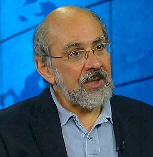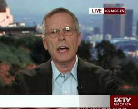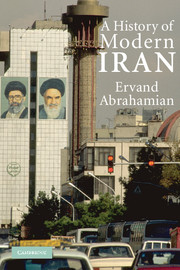A History of Modern Iran
by Ervand Abrahamian
New York:
Cambridge University Press,
2008
228 pp.
Reviewed by Patrick Clawson
Middle East Quarterly
Summer 2009 Volume XVI: Number 3
The basic left-wing view about Iran is that Mohammad Reza Shah Pahlavi was truly evil while the Islamic Republic is a mixed bag—and the United States bears heavy responsibility for all Iran's problems, including the failure of the recent democratic movement. Abrahamian, a history professor at City University of New York, has produced a history firmly situated in this paradigm, almost to the point of parody.
Consider two issues about the Islamic Republic and Mohammad Reza's [the Shah’s] rule, issues that are deeply related to the important impact each had on the lives of ordinary Iranians.
First is the Iran-Iraq war. Abrahamian devotes less than two pages to the war. He spends more space analyzing the shah's military buildup than on the war itself, in which hundreds of thousands of Iranians died.
Long paragraphs deplore the social dislocation caused by the rapid growth of the shah's era, but Abrahamian does not find it worthwhile mentioning the millions of Iranians forced from their homes by the war. He tells the reader nothing about events seared on the souls of Iranians, such as the use of chemical weapons or the "war of the cities" in which millions fled Tehran each night in fear of missiles.
The second issue is the extraordinary economic growth under [the Shah] Mohammad Reza and the economic decline that took place under the Islamic Republic.
Even a careful reading of Abrahamian's text fails to show that, from 1960 to 1976 [ i.e. in the Shah’s last decades of reign], the rate of growth of Iran's national income was among the fastest of any country in the world—faster than the Chinese economy has grown in the last fifteen years, for example.
Nor would the reader learn that in the Islamic Republic's first decade, per capita income was cut in half [despite skyrocketing oil revenues due to the Second oil boom].
Instead, Abrahamian treats us to long discussions about the inequality of income distribution under [the Shah] Mohammad Reza. Evidently sharing poverty is, to Abrahamian, more worthy than creating wealth. And he goes on to praise the Islamic Republic for accomplishments that were well short of what Iran achieved under the Shah, such as the increase in rural life expectancy, which has risen under the Islamic Republic but at a slower rate than during the Shah's reign.
These two examples are hardly exhaustive. Whether about human rights issues, repression, cultural accomplishments, or foreign policy, Abrahamian's account is exhaustive on the shortcomings of [the Shah] Mohammad Reza's period and cursory on problems of the Islamic Republic while he is similarly brief about the Shah's accomplishments and detailed about those of the Islamic Republic.
In a similar vein, the 1926-41 rule of Reza Shah is painted in dark tones while what Abrahamian calls "the nationalist interregnum" of 1941-53 is described with starry eyes.
And Abrahamian rarely misses an opportunity to cast U.S. policy in the most negative light possible, often ascribing to it an influence well in excess of what it actually exerted.
Abrahamian has an extraordinary command of the details of Iranian history, and he is a good writer. All of which serves to throw into sharper relief the anti-shah agenda and the soft- peddling of the problems of the Islamic Republic.
Patrick Clawson is director of research at The Washington Institute, where he directs the Iran Security Initiative. Widely consulted as an analyst and media commentator, he has authored more than 150 articles about the Middle East and international economics and is the author or editor of eighteen books or studies on Iran.
Dr. Clawson appears frequently on television and radio, and has published op-ed articles in major newspapers including the New York Times, Wall Street Journal, and Washington Post. He has also testified before congressional committees more than twenty times and has served as an expert witness in more than thirty federal cases against the Islamic Republic of Iran.
Prior to joining The Washington Institute, he was a senior research professor at the National Defense University's Institute for National Strategic Studies, a senior economist at the International Monetary Fund and the World Bank, and a research scholar at the Foreign Policy Research Institute.








